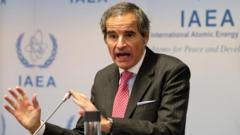The director general of the International Atomic Energy Agency (IAEA), Rafael Grossi, has articulated significant concerns regarding Iran's recent decision to escalate its uranium enrichment program. Speaking to the BBC, Grossi described Iran's move to produce uranium enriched to 60%—the threshold just below that required for nuclear weapon production—as "very worrisome." This development is perceived in many quarters as a potential response to Iran's recent military setbacks in Syria, Lebanon, and Gaza.
In his remarks, Grossi acknowledged that some Iranian politicians have been vocal proponents of pursuing a nuclear weapon; however, he indicated that current political leaders do not seem inclined to take that path. His comments were made on the sidelines of the Manama Dialogue conference in Bahrain, organized by the International Institute for Strategic Studies.
Moreover, Grossi cautioned against any military strikes on Iranian nuclear facilities by Israel, forewarning of serious repercussions—both in terms of retaliation from Tehran and the risks of radiation leakage. His warnings about the global landscape also highlighted a disturbing trend, where more countries are contemplating nuclear armament as the rhetoric surrounding nuclear weapons normalizes.
On an operational note, Grossi reported that IAEA inspectors verified Iran's increased input of partially enriched uranium into centrifuges at the Fordow facility. The facility's altered design is expected to boost the production rate of 60% enriched uranium from 4.7 kilograms to 34 kilograms monthly. In light of this, the IAEA has urged Iran to enhance safeguard measures urgently to ensure that its nuclear program remains peaceful.
Despite Tehran's denial of any intention to develop a military nuclear capability, Grossi observed that the scale and complexity of Iran's nuclear operations have expanded dramatically over the last decade. He indicated that the Iran of 2025 bears little resemblance to the Iran of 2015, signifying a troubling trend towards capabilities that could enable rapid nuclear weapons development.
Grossi's visit to Tehran last month resulted in assurances from Iranian officials regarding a limitation on their level of enriched uranium production. However, recent developments signal a stark deviation from these commitments, as diplomatic efforts between European powers and Iran seem to be faltering.
Grossi emphasized countervailing voices within Iran advocating for independent nuclear development; while he noted that government dialogue does not suggest imminent weaponization, there remains an underlying tension. The nuclear chief urged Iran to refrain from considering this "regrettable choice."
In conclusion, Grossi warned that the international nuclear non-proliferation framework faces increasing strain, as established nuclear states appear to modernize their arsenals, motivating other nations—including Iran—to contemplate their security needs and nuclear capabilities.
















